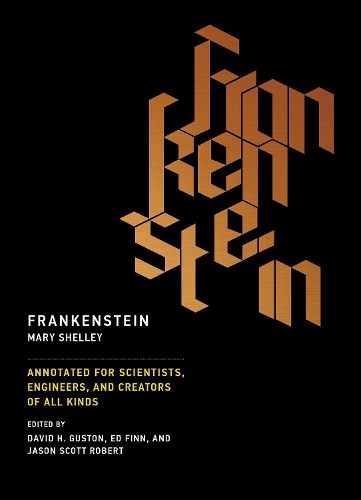
Frankenstein: Annotated for Scientists, Engineers, and Creators of All Kinds
(Paperback)
Available Formats
Hardback, New edition
Published: 4th March 2025
Hardback
Published: 29th July 2025
Hardback
Published: 24th April 1992
Paperback, Illustrated edition
Published: 1st March 2020
Hardback
Published: 25th March 2025
Paperback
Published: 23rd September 2013
Paperback
Published: 30th July 2018
Hardback
Published: 17th November 2020
Hardback, Illustrated edition
Published: 1st November 2020
Hardback
Published: 31st May 2018
Paperback
Published: 15th May 2005
Hardback
Published: 20th November 2013
Hardback
Published: 15th February 2022
Paperback, Enriched Classic
Published: 15th May 2007
Hardback
Published: 3rd November 2020
Hardback
Published: 23rd October 2013
Paperback
Published: 4th May 2012
Paperback
Published: 3rd July 2014
Hardback
Published: 14th February 2017
Paperback
Published: 16th November 2018
Publishing Details
Frankenstein: Annotated for Scientists, Engineers, and Creators of All Kinds
By (Author) Mary Shelley
Edited by David H. Guston
Edited by Ed Finn
Edited by Jason Scott Robert
Introduction by Charles E. Robinson
Contributions by Josephine Johnston
Contributions by Cory Doctorow
Contributions by Jane Maienschein
Contributions by Kate MacCord
Contributions by Alfred Nordmann
MIT Press Ltd
MIT Press
5th May 2017
5th May 2017
United States
Classifications
General
Non Fiction
Classic science fiction
823.7
Physical Properties
Paperback
320
Width 165mm, Height 229mm, Spine 21mm
Description
The original 1818 text of Mary Shelley's classic novel, with annotations and essays highlighting its scientific, ethical, and cautionary aspects.Mary Shelley's Frankenstein has endured in the popular imagination for two hundred years. Begun as a ghost story by an intellectually and socially precocious eighteen-year-old author during a cold and rainy summer on the shores of Lake Geneva, the dramatic tale of Victor Frankenstein and his stitched-together creature can be read as the ultimate parable of scientific hubris. Victor, "the modern Prometheus," tried to do what he perhaps should have left to Nature- create life. Although the novel is most often discussed in literary-historical terms-as a seminal example of romanticism or as a groundbreaking early work of science fiction-Mary Shelley was keenly aware of contemporary scientific developments and incorporated them into her story. In our era of synthetic biology, artificial intelligence, robotics, and climate engineering, this edition of Frankenstein will resonate forcefully for readers with a background or interest in science and engineering, and anyone intrigued by the fundamental questions of creativity and responsibility. This edition of Frankenstein pairs the original 1818 version of the manuscript-meticulously line-edited and amended by Charles E. Robinson, one of the world's preeminent authorities on the text-with annotations and essays by leading scholars exploring the social and ethical aspects of scientific creativity raised by this remarkable story. The result is a unique and accessible edition of one of the most thought-provoking and influential novels ever written. Essays by Elizabeth Bear, Cory Doctorow, Heather E. Douglas, Josephine Johnston, Kate MacCord, Jane Maienschein, Anne K. Mellor, Alfred Nordmann
Reviews
[The editors's] expertise speaks to Frankenstein's enduring message about existential stakes and the potentially alarming societal consequences likely to devolve from the unfettered march of science and technology. Concerns about unintended consequences were urgent at the onset of the Industrial Revolution and the Nuclear Age, and they are, if anything, more urgent now.
Los Angeles Review of BooksThe critical essays accompanying the text are eclectic, cross-disciplinary, and incisive....authoritative, yet accessible, and firmly situates both Shelley and her novel in relation to our contemporary tech-oriented age.
LawfareThis newly annotated edition of the classic wrests the text from English majors and hands it to STEMers, but also brings the concerns of literaturemoral weight, literary device, creativityto readers at risk of underestimating their importance.
Atlas ObscuraAuthor Bio
David Guston is Professor and Founding Director of the School for the Future of Innovation in Society at Arizona State University, where he also serves as Codirector of the Consortium for Science, Policy, and Outcomes.. Ed Finn is Founding Director of the Center for Science and the Imagination at Arizona State University, where he is also Assistant Professor with a joint appointment in the School of Arts, Media, and Engineering and the Department of English. Jason Scott Robert is Lincoln Chair in Ethics, Associate Professor in the School of Life Sciences, and Director of the Lincoln Center for Applied Ethics at Arizona State University. Jane Maienschein is Regents' Professor and Parents Association Professor in the School of Life Sciences and Director of the Center of Biology and Society at Arizona State University. Alfred Nordmann is Professor of Philosophy at Technische Universit t Darmstadt and Adjunct Professor of Philosophy at the University of South Carolina.
